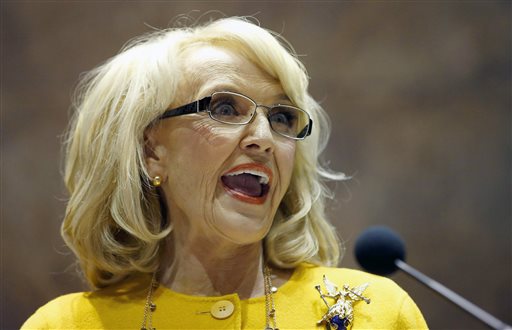The deed is done, Gov. Jan Brewer's veto pen is stilled, but one question - one alarming question - should be swimming in the heads of all those who supported the actual religious liberty intent of Arizona bill SB1062:
What's next?
Will ministers opposed to same-sex marriages be forced to conduct them? Will doctors opposed to abortions be required to perform them? Will kosher delis have to offer non-kosher food? Will booksellers be required to sell what to them is pornography? Will drug store owners be required to carry abortifacients?
The veto of the bill, which would have protected the rights of Arizona business owners to reject service to customers on religious grounds, in effect says faith has no bearing on whom businesses serve.
Without the protection of faith, you can easily see legislation mandating any of the above.
The actual intent of the Arizona bill became so clouded in the run-up to the governor's decision that three supporters of it urged its veto because it had "been mischaracterized by its opponents as a sword for religious intolerance," as an attack on gay rights.
This is the world many people of faith in the United States find themselves in, an upside-down world in which white is black, black is white and what they've been taught in the name of their God -- that marriage is between one man and one woman, for instance -- is deemed not just wrong but hateful.
"We see a growing hostility toward religion," said Josh Kredit, legal counsel for the Center for Arizona Policy, a social conservative group that backed the legislation.
These people of faith are reeling. They feel as if they've been hit by an 18-wheeler. These are not zealots, either. These are average people who live their lives, do their jobs, attend their places of worship and don't have a hateful bone in their bodies.
With all the oxygen in the room taken up by those who would create the politically-correct issue of the day and their willing accomplices in the media -- and an Attorney General of the United States who declared earlier this week he wouldn't defend any law that in his mind was discriminatory -- they wonder if anyone speaks for them anymore.
Oh, the average person can understand Brewer's veto. She had political leaders of both parties, major corporations, and gay and lesbian activists breathing down her neck. She'd heard the threats of what really amounted to blackmail and didn't want the state to lose business. She also didn't want it to become the focus of late-night comedians as the state did in 2010 when it rightly tried to crack down on illegal immigration.
But she, like so many before her in the past five years or so, fell on the sword of expediency.
"The Arizona religious liberty bill was a good piece of public policy," Ryan Anderson of the Heritage Foundation told Breitbart News. "But because of constant misrepresentation in the media, a bill that never mentioned gays, lesbians, marriage, or same-sex anything was labeled anti-gay Jim Crow legislation. In truth, the bill merely protected religious liberty and took nothing away from anyone.
"Everyone should be free to live and love as they choose," he said, "but no one should demand that government coerce others into celebrating their relationship. All Americans should remain free to believe and act in the public square based on their beliefs about marriage without fear of government penalty."
The vetoed bill, in fact, was similar to Arizona's existing Religious Freedom Restoration Act but clarified that business owners would be covered by the law if 1) "state or local government requires them to violate their religion in the conduct of their business" or 2) "when sued by a private citizen invoking state or local law to demand that they violate their religion."
However, a photographer in neighboring New Mexico was sued for declining to photograph a same-sex commitment ceremony and a Colorado baker was given an ultimatum to offer services for a same-sex wedding or face fines, so Arizona lawmakers wanted to be sure.
And as 11 law professors from around the country --Democrats and Republicans -- assured Brewer in a signed letter, "SB1062 does not say that businesses can discriminate for religious reason."
But instead, people of faith will be wondering what's around the corner.

